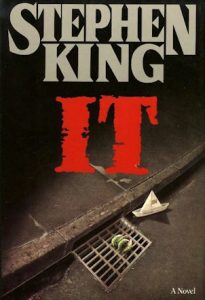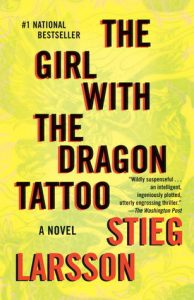The Rise in Thrillers: Cue “Thriller” by Michael Jackson
Angie Haas//Blog Writer
It, Get Out, Annabelle: Creation, and Happy Death Day. What do these movies have in common? They all fall into the horror/thriller genre and were all released this year. But movies aren’t the only way get your heart racing — these movies are often based off of books, such as Stephen King’s It. So, can you get the same feelings reading a book as you can watching a movie? I would argue yes, but of course the story is subject to your imagination.

Movies aren’t the only thrillers, however; there have been many successful novels and the numbers continue to grow each year. Some of the most popular novels (excluding It, which I already mentioned) include The Girl on the Train, Gone Girl, and The Girl with the Dragon Tattoo. While these novels have all been turned into movies, the books came first, all of which were released in the 2000s and which were immensely successful. Between books and movies, there has been a clear rising trend of the thriller/suspense genre and a decline in literary fiction — or so it appears on the surface of the best seller’s lists.
So, why are we so attracted to this genre and will our favorite genre fiction authors start writing thrillers? In the 1950’s Dr. Seuss was in his prime and we had books like Charlotte’s Web, The Catcher in the Rye, and East of Eden. Fast forward to the 1980’s and popular books included The Color Purple and Matilda; however, Stephen King’s popularity was on the rise having just published It and Misery. Why this sudden shift in popular genres? I think there’s a different connotation between these genres and that maybe to us they symbolize “growing up.” Yeah, most of us read Charlotte’s Web and Matilda in elementary school and were probably forced to read The Catcher in the Rye in high school; but, most people I know don’t reread these books once they are older unless they’re reading them to children. For some reason, once we get out of high school, it seems like a lot of us gravitate towards books that make our heart race and keep us up all night.
This summer, I read the first two books in The Girl with the Dragon Tattoo series and, while they were hefty novels, I absolutely loved them. I think the reason we like these books and movies in general has less to do with the what the content is, and more to do with how the content makes us feel. Our arousal is at its peak when watching these movies and reading these novels due to something called the “excitation transfer process,” causing our emotions to intensify and our body to exert the fight or flight response. While some of us choose “flight” and don’t enjoy this genre (or say we don’t), our curiosity usually gets the best of us and we decide to stick with what we are reading/watching just for the thrill of it all and the way that the story excites us.

I think one of the most appealing aspects of these stories is the characters in them and how we are able to experience the thrill vicariously through them, without us experiencing any immediate danger. One of the main attractions of reading, as a whole, is being able to submerge yourself into a whole different world without any consequences. When we were kids we probably liked books such as Alice in Wonderland because of all of the creativity involved with it — the crazy world and creatures were perfect for our hyper imaginations. Books like It and The Girl with the Dragon Tattoo are like the adult version of Alice in Wonderland. When we read these novels, we enter a world of thrill that we may not otherwise experience in everyday life — our idea of thrill just changes as we grow older and more mature. These novels, which are simply just a collection of words on pages, can transfer us to a world that makes our palms sweaty and our body tense without any consequences for the reader.
Overall, I think we as humans are attracted to suspense just because of the way we are wired. We like to take ourselves out of the real world and into fictional ones, to experience things we are too afraid to experience in real life, and to have the excitement without the danger.
